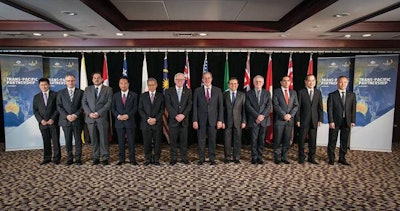
Passage of the Trans-Pacific Partnership could be worth $4.4 billion annually to American farmers, according to a negotiator who helped craft the pending trade agreement.
On June 9, Darci Vetter, the U.S. Trade Representative’s chief agricultural negotiator, argued the merits of the trade agreement between the United States, Canada, Australia, Brunei, Chile, Japan, Malaysia, Mexico, New Zealand, Peru, Singapore and Vietnam. Vetter said U.S. farmers need the partnership, or TPP, to ensure there will be a market for their products in the future and bolster their income.
If the TPP, signed in October 2015 but still not approved by U.S. Congress, does not pass, Vetter said the economic consequences could be dire for U.S. farmers and could hand economic leadership of the Pacific region over to China.

Darci Vetter, the U.S. Trade Representative’s chief agriculture negotiator, answers questions during a speech at the 2016 World Pork Expo in Des Moines, Iowa. | Austin Alonzo
What is the TPP?
Vetter called the deal the highest-standard trade deal in history. It will give farmers and ranchers unprecedented access to 40 percent of the planet’s gross domestic product and, by 2020, two-thirds of the world’s middle class, she said.
Trade deals with many of the TPP signatory nations are already in effect, but the deal would modernize the agreements and add important language about the environment, labor standards and electronic commerce. Several key provisions affecting agriculture – including biosecurity, cooperation on the inclusion of feed additives or animal pharmaceuticals that are approved in one nation but not another and the establishment of rules to protect perishable goods from going to waste if stopped in customs – are included as well.
While the U.S. already ships 43 percent of all its agricultural exports – worth about $57 billion annually – to the TPP nations, the deal will promise lower tariffs and less hassle for U.S. imports and greater access to rapidly developing markets in need of high-quality cereal crops and animal protein.
“Every agricultural product without exception will be liberalized in some way. That has not always been the case in past (free trade agreements) the United States has negotiated and it certainly hasn’t been the case with our trading partners,” Vetter said.
The deal promises to remove or reduce barriers to trade with partnership nations. Countries without an existing trade agreement with the U.S. – Brunei, Japan, Malaysia, New Zealand and Vietnam – will eventually eliminate 93 percent of their agricultural duties with the U.S.
Vetter said the TPP would essentially export the way the U.S. does business. It would not require changes in how the U.S. operates and it will ensure a level playing field among the signatory nations.
How TPP would help farmers
For farmers, Vetter said, TPP will mean more income for farmers. The most recent estimate from the American Farm Bureau Association says the partnership would add $4.4 billion in net farm income annually.
Specifically for pork, the measure will make exporting to Japan much cheaper and less complex and eliminate Vietnam’s tariffs on pork in 5 to 10 years. Vetter said projections indicate TPP could mean between $940 million to $219 million in new exports for the U.S. pork industry.
The TPP will require its signatory nations to improve their sanitary and phytosanitary standards, lower technical barriers to trade and establish rules for the management of intellectual property. Vetter said the partnership will force state-owned enterprises to behave the same as private companies, establish basic rules for labor and human rights and protections for the environment. Those actions will make competing nations play by the same rules as U.S. farmers and ranchers.
The TPP will also require countries to address non-tariff trade barriers that allow countries to block trade with the U.S. because of the sporadic presence of a pest or a disease. The measure will establish rapid response mechanisms to prevent containers full of perishable goods from rotting in customs; promote transparency and anti-corruption in customs enforcement; make U.S. standards on food safety the international standard and establish rules on biotechnology. Vetter said the biotechnology and organics provisions will establish transparent, science-based and predictable standards for dealing with issues over feed additives and pharmaceuticals that countries don’t share approvals.
If the TPP is not passed and enacted, U.S. agriculture would stand to lose out on billions, according to estimates shared by Vetter. The Farm Bureau said the livestock industry will lose $5.8 billion in cash receipts if the TPP is not enacted and the U.S. international Trade Commission. It said U.S. exports would be $7.2 billion lower if TPP is not passed.
The political case for TPP
The TPP is more than a trade deal, Vetter said. It’s an opportunity for the U.S. to set the economic agenda – and assert its leadership role – in Southeast Asia and the Pacific. If the U.S. balks at signing the deal it put together, it would damage the nation’s standing in the Pacific and strengthen China’s economic and political influence.
Furthermore, while the U.S. withholds passage of the TPP, other countries are not standing still. Instead, they are crafting their own free trade agreements that aren’t to the same standard. As the U.S. and the TPP signatory nations are finalizing their deal, China is leading a preferential trade deal in Southeast Asia called the Regional Comprehensive Economic Partnership, or RCEP. The deal includes many TPP nations as well as India, Cambodia, Myanmar, South Korea, Laos, Thailand and the Philippines.
Vetter said the deal gives China preferential access to 35 percent of the global economy and removes its tariffs while putting high tariffs on the U.S. She said the deal will not protect worker rights, the environment or a free and open internet nor establish rules governing state-owned enterprises. If RCEP goes ahead of TPP, China will be setting the agenda for trade in Southeast Asia and the Pacific.
When asked about why U.S. public opinion is against the TPP and the leading presidential candidates are against it, Vetter said she thinks the answer is simple: Average people don’t understand the ramifications and the language of the complex, more than 5,000-page-long trade agreement and, because they do not understand it, they are fearful of it. She said people equate the measure with globalization and, because they are anxious about what globalization means for the U.S. economy, they reject it.
“If we don’t pass TPP, globalization will not stop. Countries will not stop seeking these international supply chains looking for ways to expand their operations,” Vetter said. “We are not going to put the globalization genie back in the bottle, but we can craft it in a way that can better meet both our economic interests and our values.”
Congress could ratify the TPP after the November 2016 presidential election. The measure is widely supported by U.S. agriculture organizations.

















